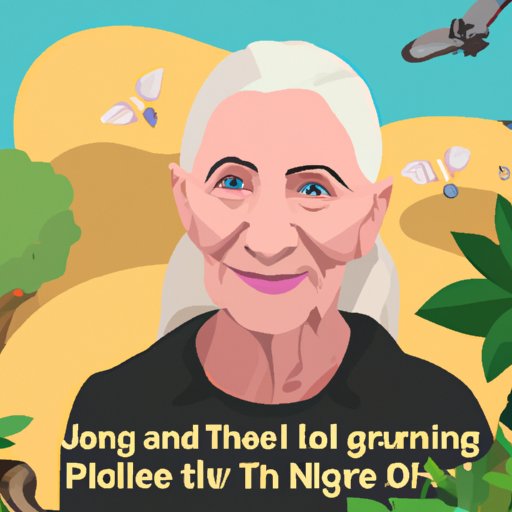Introduction
When most people think of world-renowned scientist Jane Goodall, they think of her groundbreaking research into chimpanzee behavior. But what many don’t realize is that Goodall’s research and influence have had an incredible impact on the field of science. From her early studies in Tanzania to her current work with the Jane Goodall Institute, Goodall’s legacy will be felt for generations to come.
Goodall’s Research on Chimpanzee Behavior
Goodall first made a name for herself when she began her groundbreaking research on chimpanzee behavior in Tanzania in 1960. For months, she observed the chimpanzees in their natural habitat, taking detailed notes on their behavior, diet, and communication patterns. Her observations revealed that chimpanzees are much more complex than previously thought, exhibiting behaviors such as tool use, cooperative hunting, and even warfare.
Goodall’s findings were revolutionary. In the past, scientists had assumed that humans were the only species capable of complex behavior. But Goodall’s research showed that chimpanzees shared many of the same characteristics as humans, challenging existing notions about animal behavior.
Goodall’s research also had implications for the field of evolutionary biology. By studying the behavior of chimpanzees, Goodall was able to shed light on the evolutionary history of humans, revealing the similarities between our two species.
Environmental Impact of Goodall’s Work
In addition to her scientific contributions, Goodall has also had a significant impact on the environment. Her research led to increased protection of endangered primates, and her advocacy for conservation efforts has helped preserve fragile ecosystems around the world.
Goodall has also been instrumental in raising awareness about the threats facing our planet. Through her work with the Jane Goodall Institute, she has traveled to some of the most remote regions of the world to educate local communities about the importance of protecting their environment.
History of Goodall’s Career
Goodall’s career began in 1960 when she set out for Tanzania to study chimpanzees in their natural habitat. After months of observation, she published her groundbreaking findings in the scientific journal Nature. Over the next few decades, she continued to conduct research and publish papers on chimpanzee behavior.
Today, Goodall is still active in the field of science. She serves as the director of the Jane Goodall Institute, an organization dedicated to promoting conservation and research on primates. She also travels extensively, speaking to audiences around the world about the importance of protecting our planet.
Influence of Goodall on Other Scientists and Conservationists
Goodall’s influence extends beyond the scientific community. Her groundbreaking research inspired a new generation of scientists and conservationists, who have since followed in her footsteps. Her work has also raised awareness about the need to protect our planet and its endangered species.
Goodall’s influence can also be seen in popular culture. She has been featured in books, films, and television shows, bringing her message of conservation to a wider audience. Her celebrity status has enabled her to raise funds for her charitable causes, helping to make the world a better place.
Role of Technology in Goodall’s Research
Goodall’s research has also been aided by modern technology. To observe her subjects, she used cameras and microphones to record their behavior. She was also among the first scientists to use drones to study animals, allowing her to capture images of chimpanzees in their natural habitats.
The use of technology in Goodall’s research has had a major impact on the field of science. By utilizing modern tools, she has been able to gather data that would have been impossible to obtain without them. This has opened up new possibilities for future studies.
Comparison of Goodall’s Findings to Other Primatologists
Goodall’s research has also been compared to the findings of other primatologists. While there are similarities between her observations and those of other researchers, there are also some notable differences. For example, Goodall’s research revealed that chimpanzees are capable of complex emotions, while other primatologists have argued that this is not the case.
Conclusion
Jane Goodall is one of the most influential scientists of our time. Her groundbreaking research has had an enormous impact on the field of science, inspiring a new generation of scientists and conservationists. From her early studies in Tanzania to her current work with the Jane Goodall Institute, Goodall’s legacy will continue to shape the way we view the world for generations to come.
Goodall’s influence will also be felt in the years to come. As more scientists and conservationists continue to follow in her footsteps, her legacy will live on. With her help, we can create a brighter future for our planet and its inhabitants.
(Note: Is this article not meeting your expectations? Do you have knowledge or insights to share? Unlock new opportunities and expand your reach by joining our authors team. Click Registration to join us and share your expertise with our readers.)
